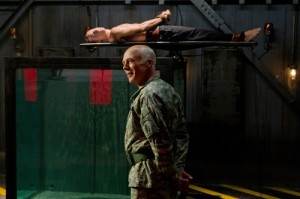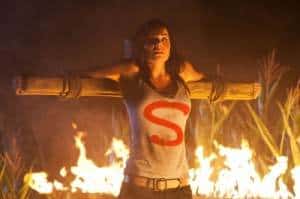Before I begin, I was away last weekend and thus unable to review the last episode. I found 10.08 “Abandoned” to be a cracking piece of television when I finally watched it on Wednesday. Great acting from Cassidy Freeman and Teri Hatcher, along with the sense that Darkseid’s plan has been for a long time. It helped clear up many concerns I was having with the seasonal (and series) arc, even if I still had some reservations. Now, that being said, let’s roll with the new ep!
This episode is essentially proof that the showrunners know where they’re taking this story, even if sometimes we (the audience) get a little confused and apprehensive. It’s an episode best described as one where a myriad of contradictory plot-points and gaps in logic are brought together via the use of a man and woman from Atlantis and a general with an Omega symbol inside his head.
Luckily, Smallville is just crazy enough that the above makes sense.
The episode achieves the goal of clearing all the confusion about the seasonal arc through the simple, and indeed logical in hindsight, concept of the darkness prevalent since the first episode being rooted in fear. And by first episode, I mean the first episode of the entire series. Short-term fans of the show will recall Checkmate in Season 9, at the time a rather muddled threat that seemed to fizzle out. Well, perhaps that was the point. Checkmate was the answer Earth provided for situations such as this, and it failed. They lost to the Kandorians, said Kandorians scarring numerous landmarks in the process. It was confirmation of what the people of Earth had been trying to hide – there were more than superheroes out there. Their actions spread a fear that humanity, within the confines of this show, had been hiding for years.
- In Season One, we had the first Meteor Storm and Roger Nixon playing upon the danger of humanity knowing about ‘the gifted’ when he tried to expose Clark to the world for profit.
- In Season Two, we had ‘Red’ and ‘Rush’ to show how dangerous Clark could be if he stopped caring about humanity and embraced his Godlike nature.
- In Season Three, we saw Morgan Edge play upon the ideas Roger Nixon raised by trying to manipulate Clark into stealing various items for him as a hired goon.
- In Season Four, there was another Meteor Storm that doubtless raised the alarm of the US Army and Government. It played upon the idea that they’d have to mobilise themselves at some point.
- In Season Five, the actions of Brainiac and Lex Luthor (a vessel for Zod) crippled Metropolis. It was the first clear-cut sign of an Alien force attacking American soil and being nigh unstoppable.
- In Season Six, the aftermath of the Metropolis attack left the city devestated for weeks. It also allowed the Phantom Zoners to escape with Clark, confirmed a long-held belief that Clark’s humanity was key to him becoming a hero instead of another Zoner.
- In Season Seven, Kara’s escape from her frozen state within Reeves Dam set Lex on his path to uncovering the truth about Clark. It underscored how many people had died to protect Clark, as well as play upon the concept that humanity always fear what they can’t understand.
- In Season Eight, the transformation of Davis Bloome into Doomsday led (in theory) to devastation across Metropolis. With the emergence of The Blur and Oliver taking a bigger role, it kick started the idea of superheroes and supervillains tackling each other and being unregulated on the streets.
- In Season Nine, we had Checkmate falling and the Kandorians burning various landmarks. This, combined with The Blur becoming oddly cold, left the people of Metropolis understandably concerned. It built to a finale where Clark sacrificed himself to save everyone, and in the process brought Darkseid through a Boom Tube to planet Earth
While I don’t think Season One to Season Nine was always planned as a route to Darkseid, it strikes me as the writers taking advantage of retroactive continuity and a general arc in the same way as the Supernatural writers do. My gut tells me that this may be an adaptation of a different arc, one in which Lex and Clark battle over humanities fate and Lex plays on Clark’s weaknesses. At any rate, the series seems much better when you take into account all of the actions governed by fear and how Clark has had to battle with that part of himself. I’ve criticised the show a lot for not including Darkseid enough, but the Vigilante Registration Act and the Suicide Squad are introducing a fear and weakness within humanity that Darkseid can exploit and corrupt.
And exploitation and corruption are prevalent throughout this episode. While Slade Wilson (as played by Michael Hogan, which I’ll get to later) has been corrupted, the sense is that beneath the corruption he’s a man making difficult choices for the greater good. He does use extreme tactics, but so does Aquaman (aka Arthur Curry, played by the returning Alan Ritchson.) It creates an interesting series of contrasts and parallels, as both are people doing things they believe in that edge the surface of being criminal. This stays in established continuity for Arthur (here known more as Orin, in keeping with his comic-book roots), which painted him as the determined vigilante of the sea who views the situation as akin to a war. As we saw in Aqua and Justice, he’ll commit eco-terrorist acts to protect the sea and strike back against people he feels have crossed the line. This contrasts with Clark, who bridges a gap between Slade and Arthur. It also serves up some nice parallels.
- Both Clark and Arthur are orphans.
- Clark comes from above, and Arthur comes below. Neither are strictly speaking human.
and:
- Judging by Arthur’s appearance here, he seems to have accepted his Atlantis heritage in a similar way to how Clark has accepted his Kryptonian heritage.
This feels a little retroactively included, but one can make a case that each Aquaman appearance has shared a thematic similarity to where Clark is at any given time. In this episode, Alan Ritchson (likely bolstered by his character taking second stage, and having a wife) delivers a self-assured performance that suggests a more serious character than the goofy superheroism of Aqua and Justice. He seems fully-formed in the role, sharing the same lack of histrionics that Tom Welling showed in Homecoming as Future Clark Kent. It’s some fantastically subtle acting, putting a gravity into the situation and really making it sad that we’re getting to a stage where every member of the Justice League is becoming the iconic representation of their characters.
In saying that, I wasn’t impressed with the lack of mention and follow through in relation to Arthur getting married. Mera (nicely played by Elena Satine) may have been beautiful, feisty, and decidedly undamsel like, but the lack of communication between the Justice League on the issue seemed odd. The show went to great lengths to convince us that the group having a communication breakdown was a big thing, but wouldn’t they all know about Mera in that case? The surprise reveal felt a little fake here, given no-one (except for Lois) spent any time questioning Mera. It felt like a mis-step for Smallville, especially after Abandoned and the cracking way that Jor-El’s backstory was mixed together to allow Clark a chance to see that his parents really did love him and his father felt he’d failed his son.
There’s also some been some questions raised by people online about the casting of Michael Hogan as Slade Wilson. Mostly issues related to age appropriateness in relation to where Clark currently is (i.e. pre Superman), and whether Michael Hogan suits the character. I’m not a big fan of Slade Wilson as a character in terms of backstory and the like. He works for me, but I don’t know a lot about him. Most of what I know is from Identity Crisis (Brad Meltzer, terrific graphic novel) and that seems a love/hate story on the internet of terms of people’s reactions to character moments. So I can’t really say whether he works in relation to that character. What I will say is that, to me, Michael Hogan is a great actor. He blends a sense of the real world into the show, adding a similar gravitas to John Glover (who played the original magnificent one, Lionel Luthor.) He sticks to the rough spirit of the existing character, namely a tactical genius with questionable morals, while coming up with an adapted character that works for this particular material.
Slade also shares some tense scenes with Lois Lane, which serve to remind us that she is an outstanding reporter and good at sleight of hand. This keys in nicely given how the episode confirms that Lois is Clark’s equal as Mera is Arthur’s.
My final thoughts on the episode are mostly positive. I’m a tad perturbed that they tried to play Mera for a surprise, when we could have had Lois provide the audiences perspective on an introduction to her. But that, to me, is the only flaw. The episode was fun, well-paced, and featured a great return for Arthur Curry. Alan Ritchson provided an iconic take on Aquaman, making him come across as an ensemble dark horse and rise up the ranks of the Justice League. Is it too much to ask for a Justice League telemovie at some point? Perhaps, I’ll lull under a loose hope of that. It’d be a shame to waste such a great group of actors.
A-
 Follow Us
Follow Us





So nice to read a well reasoned and written review instead of the ranting that I see so much of by other reviewers. Thanks for the thought provoking article.
Ian – beautifully reviewed – I give this ep. an A+ :)